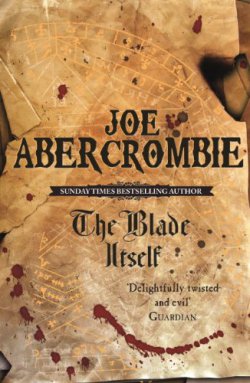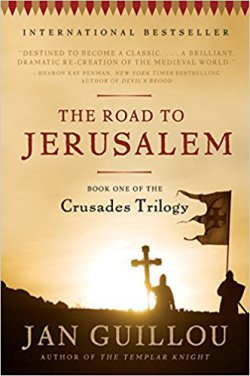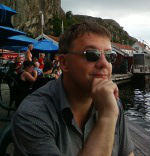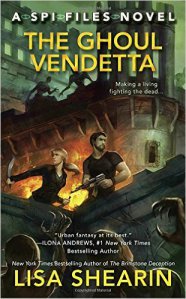I don’t read much heroic fantasy, for various reasons. A good one is that it all comes in such fat multi-volume series that I simply don’t have the time. But a deeper, slightly more sneaking one is that, well, it’s all a bit silly, isn’t it? It’s not real. Science fiction is generally set in present-day or future societies that could happen. Fantasy is based on past societies that didn’t happen, or can’t happen, so there.
 This isn’t entirely fair but it’s always there. Good heroic fantasy gets around it by being good. I recently read Joe Abercrombie’s The Blade Itself and enjoyed it a lot: for the characters, the world-building, the humour and the sheer enjoyment of the writing. But still I get this nagging feeling that tells me I should be reading something else, and it isn’t at all helped by reading something like Jan Guillou‘s Templar Trilogy.
This isn’t entirely fair but it’s always there. Good heroic fantasy gets around it by being good. I recently read Joe Abercrombie’s The Blade Itself and enjoyed it a lot: for the characters, the world-building, the humour and the sheer enjoyment of the writing. But still I get this nagging feeling that tells me I should be reading something else, and it isn’t at all helped by reading something like Jan Guillou‘s Templar Trilogy.
Guillou himself is an interesting character – an investigative journalist and spy writer who did time in jail for revealing that the land of cuddly Volvo-driving Abba fans has a secret intelligence agency that can match the CIA dirty trick for dirty trick. That’s life on the front line of the Cold War. His character of Arn Magnusson is a local Swedish folk hero because Guillou cleverly takes Arn’s fictitious life and wraps it into real history in the form of the birth of the modern kingdom of Sweden. For instance, with a bit of handwaving the fictitious Arn becomes the grandfather of the very real Birger Jarl, whose grave I have seen and once sort of wrote a poem about. All the locations are visitable, and most of them are within a few miles of my inlaws. One of life’s innocent pleasures is to watch Bonusbarn’s face when he asks with resignation why we’re looking at yet another church and we say “This is where Arn …”
I was introduced to Arn’s adventures by my future wife several years ago, but it’s taken till now to finish them because at first only the first two books were translated into English. After that the publisher pulled the plug … until recently. Different publisher, different translator, still the third book. Finally I know how it ends! Though given that Sweden exists, I had a shrewd suspicion.
 In the first book, The Road to Jerusalem, Arn is born into minor Swedish nobility and for various reasons spends most of his childhood raised by monks, including an ex-Templar who teaches him various extracurricular non-monkly fighting skills. This is handy because at the end of the book Arn inadvertently sleeps (consecutively) with two sisters (hey, it could happen to any innocent young lad from the monastery), one of whom is his true love and one of whom is a scheming minx. For this sin he must do 20 years penance as a crusader in the Holy Land.
In the first book, The Road to Jerusalem, Arn is born into minor Swedish nobility and for various reasons spends most of his childhood raised by monks, including an ex-Templar who teaches him various extracurricular non-monkly fighting skills. This is handy because at the end of the book Arn inadvertently sleeps (consecutively) with two sisters (hey, it could happen to any innocent young lad from the monastery), one of whom is his true love and one of whom is a scheming minx. For this sin he must do 20 years penance as a crusader in the Holy Land.
This brings us to the second book, The Templar Knight, which switches between his story and the story of the second crusade, and his beloved Cecilia doing her own 20 years penance in a convent back home. From her perspective we see the birth pangs of the new Swedish nation, while Arn’s purity of heart, nobility and Christian virtue earn him the respect of Christians and Muslims alike, and make him one of the few crusaders, and very few Templars, to make it out of the Holy Land alive after the disastrous Battle of Tiberias. And finally – finally! – in Birth of the Kingdom Arn returns home determined to use his military skills and considerable wealth to bring peace to his homeland and forge it into a new nation, the kingdom of the Sveas, or Svea Rige, as you might call it.
If you read heroic fantasy for the world-building then medieval Sweden is described in enough detail to suit your every need, with no feeling of anything being contrived just to get a little extra buzz or laugh. (Plucking just one example from the air, like Arn and Cecilia’s wedding night being unable to commence until the archbishop has made it up the stairs to bless them in bed.) If you read it for the military clashing and banging then Arn has it in spades, and the version of Christianity practised by the Swedes – a mixture of literalism, ritual, pragmatism and Marian veneration, all with residual pagan overtones – presses all the right buttons for anyone expecting arcane religions and magic. It’s exactly the same as reading heroic fantasy, except that it isn’t and it’s a guilt-free trip.
Note: nothing herein in any way precludes me trying to write heroic fantasy if I ever decide that’s the direction my career should take.
 Ben Jeapes took up writing in the mistaken belief that it would be easier than a real job (it isn’t). Hence, as well as being the author of 7 novels and co-author of many more, he has also been a journal editor, book publisher, and technical writer. His first Milford was at Margate in 1991, which shows (a) how far Milford has come in the past 26 years and (b) qualifies him as a Great Old One, in Milford terms at least. www.benjeapes.com
Ben Jeapes took up writing in the mistaken belief that it would be easier than a real job (it isn’t). Hence, as well as being the author of 7 novels and co-author of many more, he has also been a journal editor, book publisher, and technical writer. His first Milford was at Margate in 1991, which shows (a) how far Milford has come in the past 26 years and (b) qualifies him as a Great Old One, in Milford terms at least. www.benjeapes.com





